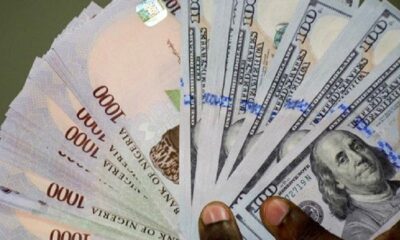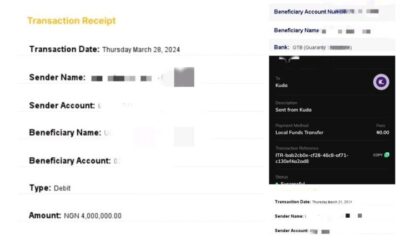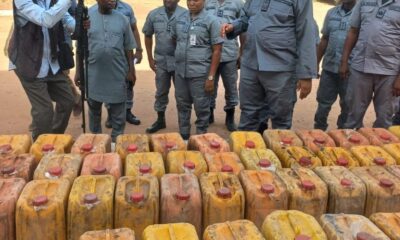Business
5 Reasons Naira Is Depreciating
Published
9 months agoon
By
Editor
The question in the minds of Nigerians today is why is the Naira depreciating or why is the exchange rate of the dollar rising rapidly?
This is a valid question given the sharp and persistent depreciation of the Naira since June 14 when the Central Bank of Nigeria, CBN announced new operational measures in the foreign exchange market.
Since then, the Naira has depreciated by 21 per cent to N930 per dollar in the parallel market, and by 66 per cent to N781.34 per dollar in the official market, namely the Investors and Exporters, I&E window.
This is more worrisome, as this trend will translate to further increase in price of goods and services, higher inflation rate, given that most of what Nigerians consume are imported or have significant import components. These include petroleum products, wheat, raw materials etc.
There are two major reasons why the exchange rate is rising rapidly, especially since June 14.
1. Declining Forex Supply
The first reason, which is also the root cause of the naira depreciation, is that supply of dollars into the economy has been declining while demand for dollars remains relatively unchanged courtesy of the country’s huge demand for dollars fuelled by dependence on imported goods for many economic activities.
This is reflected in persistent fall in the nation’s external reserves, which represents the amount of dollars and foreign currency available to the country for importation and transactions with other countries.
Data from the CBN shows that the nation’s external reserves fell by $3.23 billion or 8.5 per cent to $33.92 billion on July 9 from $37.15 billion on December 31st 2022.
Foreign exchange inflow, which represents supply, into the external reserves, comes from export earnings, diaspora remittances, foreign investment, foreign aid, external loans etc.
READ ALSO: Naira Gains Against Dollar At Investors, Exporters Window
Foreign exchange outflow, which represents demand from the reserves, occurs via funding of importation, external debt service, payment for services, travel etc.
When the inflow is more than the outflow the external reserves rises. But when outflow is more than inflow, the external reserves falls.
2. Net Forex inflow
A very critical measure of forex inflow and outflow into the economy is Net Forex Inflow, NFI. When inflow is more than outflow, NFI rises. When outflow surpasses inflow, NFI falls. Data from the CBN shows that Net Forex Inflow into Nigeria has been falling since 2019.
According to the CBN, NFI stood at $76.38 billion in 2019. It fell by 6.6 per cent to $70.65 billion in 2020, it fell again by 25.4 per cent to $52.72 billion in 2021, and again by 28.3 per cent to $37.94 billion in 2022. Thus Net Forex Inflow into the country fell by half (49.5 per cent) within four years.
A major factor responsible for this persistent decline in NFI, is the fall in foreign investment inflow into the economy. According to the National Bureau of Statistics, NBS, Capital Importation (Foreign Investment) into Nigeria fell from $23.99 billion in 2019 to $5.33 billion in 2022. This represents a huge 77.8 per cent decline in a major dollar supply source into the country.
The fact that the external reserves fell by $3.23 billion or 8.5 per cent this year indicates that the above trend in Net Forex Inflow and foreign investment inflow, has not changed.
That is confirmed by the sharp decline in the volume of dollars traded (turnover) in the official forex market, represented by the Investors and Exporters, I&E window.
In the first six months of this year, H1’23, turnover in the I&E window fell to $13.11 billion. This represents a 35 per cent fall when compared with turnover of $20.23 billion recorded in the first half of 2022, H1’22.
The above trend explains the acute dollar scarcity in the economy.
READ ALSO: Naira Further Depreciates As CBN Lifts Restrictions Naira
And like other commodities when demand is higher than the supply, the price will rise, all things being equal. Hence the continuous rise in the exchange rate, which is the price of exchanging Naira for dollars.
3. New Forex Market Measure
The second reason behind the sharp depreciation of the naira in recent times is the new operational measures for the forex market announced by the CBN on June 14.
These measures include elimination of multiple exchange rates in the official market, introduction of the willing buyer willing seller model for determination of exchange rate in the I&E window.
Prior to these measures, the CBN maintained different exchange rates for its various intervention or forex sales in the official forex market. Also the official exchange rate was kept at a level determined by the CBN.
Meanwhile, due to the decline in external reserves the CBN could not meet all genuine demand for forex, a situation that pushed many organisations to rely on the parallel market for their forex needs.
Thus while the exchange rate in the official market was relatively stable, the exchange rate in the parallel market rose steadily. Hence on June 13, the parallel market exchange rate stood at N768 per dollar while the official exchange rate stood at N471.67 per dollar, leading to a gap of N296.33 per dollar.
4. Tinubu’s Promise
The multiple exchange rates in the official market, wide gap between the official and parallel market exchange rates implied forex subsidy and opportunity for round tripping and other malpractice.
This anomaly, which was severely criticised by investment analysts, the World Bank, IMF and global rating agencies, discouraged foreign investment inflow into the country. It also discouraged repatriation of export proceeds through the banks, as well as Diaspora remittances into the country.
Thus President Bola Tinubu in his inauguration speech promised to correct this anomaly, saying that the CBN will work to achieve a single exchange rate.
READ ALSO: Naira Depreciation, Subsidy Removal Push Inflation To 22.79%
The measures announced by the CBN on June 19 were in line with the promise of the President.
Consequently, on June 14, the CBN eliminated multiple exchange rates in the I&E window, allowing demand and supply to determine the exchange rate via the ‘willing buyer willing seller model’. Also transactions in the I&E window must be trade-backed, while government forex transactions were priced at the weighted average of exchange rate of transactions in the I&E window.
Furthermore, the CBN stopped selling forex to banks for onward sale to end users i.e SME, PTA, BTA etc. All forex needs and hence demand must be done via the I&E window based on ‘willing buyer willing seller’ arrangement.
5. Objectives of the New Forex Measures
The objective of these measures however is to create transparency and confidence in the forex market in order to encourage forex inflow into the economy, especially foreign investment inflow which as noted above shrinked by 77 per cent in the last four years.
However, given the dearth of forex supply compared to the huge demand, especially backlog of unmet forex demand, estimated to be more than $2 billion, the above measures triggered a sharp rise in the exchange rate in the I&E window to N781.34 as at yesterday from N471.67 per dollar on June 13.
This also led to the continued rise of the exchange rate in the parallel market to N930 yesterday from N768 per dollar on June 13.
What Next?
This trend will continue for a while, maybe more than six months, with sharp fluctuations (volatility) in the I&E window exchange rate, until forex supply (inflow) exceeds the huge demand for forex and thus increase in the Net Forex Inflow and the external reserves.
The current situation is akin to what happened in between 2016 and 2017, which led to the creation of the I&E window and other measures which enhanced forex inflow especially from foreign investors leading to appreciation of the Naira and eventual convergence of the official market and parallel market exchange rates.
From N520 per dollar in the parallel market in February 2017 prior to introduction of the measures by the CBN, the parallel market exchange rate dropped steadily and converged with the I&E window rate at N360 per dollar in 2019.
Hopefully, this trend will be repeated in the next 12 to 18 months.
VANGUARD
You may like


Naira Slumps, Exchanges At Over N1,500 Against Dollar


Find The Man Who Stole $30000 From Me, Get $2000 Reward – Nigerian Man Cries Out


Dangote Speaks On Devaluation Of Naira


Mixed Reactions Trail Video Of Couple’s Customised N200 Notes


Naira Abuse: EFCC To Arraign Cubana Chief Priest Wednesday


Naira Abuse: ‘Ask Bob For Update’ – EFCC Issues Threat To Culprits
Business
Naira Slumps, Exchanges At Over N1,500 Against Dollar
Published
3 days agoon
May 13, 2024By
Editor
The naira continued its depreciation against the US dollar in the foreign exchange market.
Data from the parallel market section and FMDQ showed further depreciation against the dollar on Monday.
At the parallel market, a Bureau De Change operator in Wuse Zone 4, Mistila Dayyabu, told DAILY POST that the naira was sold as high as N1,517 per dollar on Monday before settling at N1,500 per dollar.
“On Monday morning, the dollar was sold at N1,517 per dollar. However, on hearing the information about the coming of the Economic and Financial Crimes Commission operatives, we started selling at N1,500 this evening, ” he said.
READ ALSO: Why Naira Is Falling – Economist, Rewane
The figure increased from the N1, 450 per dollar it traded at the weekend.
Similarly, at the official market, FMDQ data showed that they dipped to N1478.11 per dollar on Monday from N1466.31 last Friday.
This represents an N11.8 drop from the N1466.31 recorded last Friday.
Earlier, the Central Bank of Nigeria Governor, Olayemi Cardoso, said the apex bank’s Monetary Policy Committee will do everything to bring down soaring Nigeria’s inflation, which stood at 33.22 per cent in March 2024.
Business
CAC Opens Centre For Registration Of PoS Operators
Published
1 week agoon
May 9, 2024By
Editor
The Corporate Affairs Commission has inaugurated a centre for bulk registration of Point of Sale operators in its database.
The CAC Registrar-General, Hussaini Magaji, said this while inaugurating the centre stationed at its Federal Capital Territory Office in Abuja on Wednesday.
According to Magaji, the importance of registering the PoS operators in the commission’s database cannot be over emphasised.
He said the centre was well equipped with all the necessary facilities to operate 24 hours a day and ensure the commission’s achievement of its purpose.
READ ALSO: ICYMI: FG To Delist Naira From P2P Platforms
“What we did was accommodate the request from the Fintechs.
“We have allowed them to integrate with the Corporate Affairs Commission; they have developed their structure, and we gave them access.
“Once they supply the necessary details for registration on their platform, the certificate is generally generated and transmitted directly to their platform without them having to contact anyone.
“We have done this to ensure that everyone gets it easy without hitches, but if they choose to apply manually, we have a secretariat open for them to do so,” he stated.
READ ALSO: ICYMI: FG Gives Deadline To PoS Operators To Register With CAC
Recall that the Federal Government through the CAC on Tuesday issued a two-month registration deadline to Point of Sales companies, to register their agents, merchants, and individuals with the commission in line with legal requirements and the directives of the Central Bank of Nigeria.
Meanwhile, at the event, the registrar-general reiterated that the centre would be opened to all operators in the fintech industry who voluntarily submitted their agents and merchants for regularisation with the CAC.
Magaji said that the registration was in line with President Bola Tinubu’s desire to ensure financial inclusion for the youth and strengthen the fight against fraud, finance and other crimes in the country.
He further expressed his resolve to ensure compliance with the provisions of Section 863 (1) of the Companies and Allied Matters, CAMA 2020, and the CBN guidelines for Agent Banking, 2013.
READ ALSO: ICYMI: Five Things To Know About The New Cybersecurity Levy To Be Paid By Nigerians
On security, the CAC boss said that if a crime were committed using the PoS, the government would easily trace the perpetrators to the CAC data platform if such machines were registered.
“If an incident happens and they report it to CAC, if we do not have the operator’s details, we cannot respond, and that is the essence of this registration.
“The registration ensures that every detail of the person is provided, including NIN, passport photograph and all other useful documents.
“And it is an opportunity for more people to be captured into the formal sector,” he said.
The News Agency of Nigeria reports that the Special Adviser to the President on ICT Development and Innovation, Tokoni Peter attended the event.
The event was attended by Dr Salihu Dasuki, the Special Adviser to the President on ICT Policy Office, the PoS operators, and other stakeholders.
(NAN)
Business
FULL LIST: CBN Publishes List Of Licensed Deposit Money Banks
Published
1 week agoon
May 8, 2024By
Editor
The Central Bank of Nigeria has released a comprehensive list of licensed Deposit Money Banks operating within the country.
The list, which was made public on the CBN’s official website on Tuesday, provides insights into the banking landscape in Nigeria.
Banks with international authorisation include Access Bank Limited, Fidelity Bank Plc, First City Monument Bank Limited, First Bank Nigeria Limited, Guaranty Trust Bank Limited, United Bank of Africa Plc, and Zenith Bank Plc.
READ ALSO: BDC Operators Arrested As Naira Sells 1,416/$
Commercial banks with national authorisation include Citibank Nigeria Limited, Ecobank Nigeria Limited, Heritage Bank Plc, Globus Bank Limited, Keystone Bank Limited, Polaris Bank Limited, Stanbic IBTC Bank Limited, Standard Chartered Bank Limited, Sterling Bank Limited, Titan Trust Bank Limited, Union Bank of Nigeria Plc, Unity Bank Plc, Wema Bank Plc, Premium Trust Bank Limited and Optimus Bank Limited.
Commercial banks with regional licenses are Providus Bank Limited, Parallex Bank Limited, Suntrust Bank Nigeria Limited, and Signature Bank Limited.
Players in the non-interest banking sector with national authorisation include Jaiz Bank Plc, Taj Bank Limited, Lotus Bank Limited, and Alternative Bank Limited.
READ ALSO: [ICYMI]FULL LIST: 16 Banking Transactions Exempted From CBN’s New
In the merchant banking category, the apex banks listed, are Coronation Merchant Bank Limited, FBN Merchant Bank Limited, FSDH Merchant Bank Limited, Greenwich Merchant Bank Limited, Nova Merchant Bank Limited, and Rand Merchant Bank Limited.
The financial holding companies listed were Access Holdings Plc, FBN Holdings Plc, FCMB Group Plc, FSDH Holding Company Limited, Guaranty Trust Holding Company Plc, Stanbic IBTC Holdings Plc, and Sterling Financial Holdings Limited.
The Mauritius Commercial Bank Representative Office (Nigeria) Limited was listed as the sole representative office.

Harry & Meghan: Outrage As UK Journalist Says Nigerians Are Nazis

Military Declares Nigerien Terrorist Wanted For Zamfara Killings

Ministry Pushes For Walking, Cycling As Safe Means Of Transportation
Trending

 Headline3 days ago
Headline3 days agoLady Arrested For Allegedly Harassing, Cyberstalking Crown Prince Of Benin Kingdom [VIDEO]

 News4 days ago
News4 days agoTobi Amusan Becomes World’s Fastest Woman With New Track Record

 News3 days ago
News3 days agoEdo Govt Takes Custody Of 4-year-old Girl Used For Adult Content

 News3 days ago
News3 days agoBREAKING: Organised Labour Shut BEDC Head Office

 Headline2 days ago
Headline2 days ago32-year-old Nigerian Doctor Killed In US, Father Mourns

 News2 days ago
News2 days agoMan Arrested For Invading Plateau Bank With Bomb

 Entertainment2 days ago
Entertainment2 days agoVIDEO: Drama As Portable Jumps Gate To Evade Police Arrest

 Metro4 days ago
Metro4 days agoCustoms Intercepts N10m Worth Petrol En Route Cameroon Illegally

 News2 days ago
News2 days agoSee Lagos Environment Commissioner’s Funny Reply To Resident’s Complaint About Neighbours Moaning Loudly At Night

 News3 days ago
News3 days agoVIDEO: Lady Laments As Lagos Issues Demolition Notice Two Months After Property Purchase





































